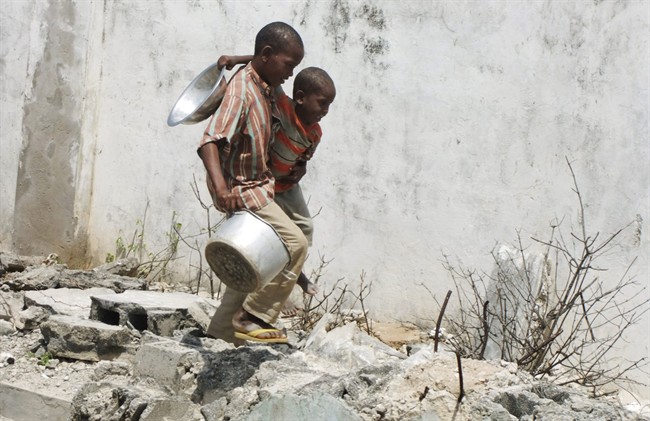TORONTO – As a devastating famine unfolds across a sub-Saharan war zone, an increasing number of Canadians half a world away are opening their wallets to support emergency relief in the Horn of Africa.

The stories emerging from Somalia and northern Kenya are horrifying – Canadians hear of mothers choosing to save one child over another due to a lack of food, militants blocking aid from being delivered and malnourished youngsters walking long, dusty roads for days to reach overcrowded refugee camps.
While relaying the heart-wrenching tales of suffering, Canadian charities seem to repeat one message over and over again – these people don’t have to die.
“It’s truly a chance to save lives,” said Nicolas Moyer, head of the Humanitarian Coalition. “We really see the disaster unfolding before our eyes…a donation today can have a major impact.”
The World Health Organization has warned that famine conditions in Somalia are likely to spread to more areas of the war-torn country as militant groups refuse to allow aid agencies to operate in some of the hardest-hit parts.
Meanwhile, thousands of refugees continue to stream into camps in Ethiopia and Kenya, some walking for days or weeks to reach assistance.
The bleak announcements by the U.N. have been key in raising red flags on the scale of the crisis around the world, and Canada is no exception, said Moyer, whose organization is made up of groups that include Save the Children, Oxfam Canada, Care Canada and Plan Canada.
“As Canadians are learning more, they are more willing to donate,” he said, adding that the coalition has raised nearly $2.9 million for aid so far.
- How caregiving impacts a generation of Canadians: ‘Unpaid work does not end’
- Fall COVID-19 vaccine guidelines are out. Here’s what NACI recommends
- Some 2019 candidates ‘appeared willing’ to engage with foreign interference: Hogue inquiry
- Thousands of Canada’s rail workers have a strike mandate. What happens now?
“Anyone around the world deserves access to food, clean water and to a safe future,” he said. “Though we can’t provide all of those things we can certainly make significant contribution towards saving lives.”
Canadians looking to support aid workers on the ground can now text, mail, phone or donate their dollars online through a number of charities. There’s even one that’s accepting aeroplan miles to help them fly to the drought-stricken region.
The Red Cross introduced the option to donate via SMS on Thursday. The Canadian arm of the international charity has raised $1.3 million for aid efforts since it began collecting donations about two weeks ago.
Spokeswoman Pam Aung Thin said the organization hopes the texting option will help drum up even more support over the coming days. Canadians can text the word “AFRICA” to 30333 to make a one-time donation of $5 to the Red Cross’ Horn of Africa Drought fund.
Ottawa has said it will match whatever Canadians give to a registered charity working in East Africa. That program is retroactive to July 6 and will run until Sept. 16, after which the government will decide how to allocate the funds.
“I think people are very encouraged by the message that every dollar that they donate will be matched,” said Aung Thin, who added that the Red Cross saw an increase in donations after the government’s announcement last week.
Meanwhile, Medecins Sans Frontiers is taking donations in the form of Aeroplan miles, in addition to cash – the miles help its doctors and nurses travel across the African region.
The charity currently has 1,400 aid workers in Somalia and plans to scale up its presence over coming weeks. As far as monetary donations go, it has received about $700,000 from Canadians specifically for its East African efforts.
The scale of the crisis however, is staggering.
“In the camps, we’re on the third generation of people that we’re caring for as patients,” said MSF fundraising director Rebecca Davies. “People are born and die knowing nothing else than need. This is a humanitarian crisis.”
Canadians are familiar with donating in times of international crisis – the earthquakes in Haiti and Japan are recent examples – but the slow onset of a famine makes it a different kind of disaster to digest.
“It’s very subtle. It’s not bombs and bullets being fired,” said Ahtsham Yousaf, development co-ordinator at Islamic Relief Canada. She noted the famine has been called the worst in 60 years.
“It’s horrible, the situation is devastatingly horrible. There’s literally hundreds of people being buried on a daily basis.
To date, the Canadian government has contributed over $70 million this year to humanitarian aid in East Africa.
Impressive as that number is, it still pales in comparison to the $300 million UNICEF hopes to raise internationally for the millions of people who will be affected by the famine.
It’s a tall order, but Kimberly Moran, chief operating officer of UNICEF Canada, said once people learn why the money is desperately needed, they tend to give.
“The children in Somalia are dying as they’re walking towards these camps,” she said. “Those are preventable deaths, they need to be fed.”
UNICEF has raised about $800,000 for East African famine-relief so far and accepts donations online, through mail, phone and text as well.
“We saw a spike when the famine was announced and when the government matching was announced,” Moran said. “Canadian donors have been very generous over the years with emergencies and I think they’d like to play a big role in trying to help the children in this region.”




Comments